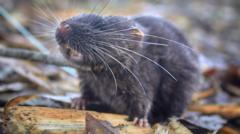Trond Larsen, a senior director at Conservation International, emphasized the significance of these findings, especially in areas facing human-induced challenges like deforestation. Indigenous groups, especially the Awajún people, played a vital role in this research, utilizing their extensive knowledge of local biodiversity to aid the expedition. Yulisa Tuwi, an Awajún participant, expressed pride in the findings that enable her community to protect their cultural and natural resources.
Among the new species is a dwarf squirrel that is half the length of its UK counterpart and possesses a unique genus distinction, a spiny mouse with resilient guard hairs, and eight different fish species. The expedition highlights the urgent need to study and protect these regions, as biodiversity remains under threat from human activities. Conservation International's efforts bring attention to the need for ongoing research and collaboration with indigenous communities to preserve these vital ecosystems.
Among the new species is a dwarf squirrel that is half the length of its UK counterpart and possesses a unique genus distinction, a spiny mouse with resilient guard hairs, and eight different fish species. The expedition highlights the urgent need to study and protect these regions, as biodiversity remains under threat from human activities. Conservation International's efforts bring attention to the need for ongoing research and collaboration with indigenous communities to preserve these vital ecosystems.


















